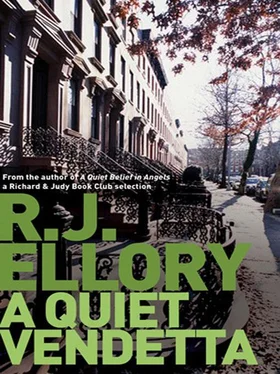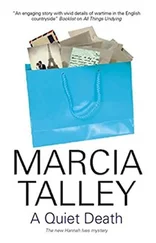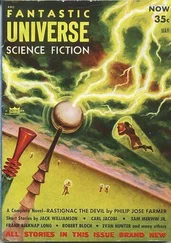He gripped my hand tighter. He was asking me to stay, to be one of the family again. I would return to a life I believed I had left behind. This time it would be different. This time I had a son of fourteen years old, and he would have to be protected from the truth of what I had done – and might yet do. This, of all things, would be the greatest challenge. And what was my other option? To visit New York, to see America for a handful of weeks, and then to return to Cuba, my son perhaps unhappy, homesick for the wide and awe-inspiring world he had glimpsed, and wait until I died?
I looked down at the floor. I closed my eyes.
I believed I had already made my decision as I sat on the edge of Victor’s bed that night and told him we would come.
‘Yes,’ I said, my voice barely audible. I looked up and cleared my throat. ‘Yes, Don Calligaris. I will stay here. This is my home, and I have returned.’
Don Calligaris clapped his hands together. ‘Ha!’ he exclaimed, his smile wide. He rose from the chair. I rose also. He reached out and placed his hands on my shoulders. He pulled me close and hugged me. ‘My brother,’ he said. ‘Ernesto Perez, my crazy Cuban brother… welcome home!’
It began with the little things; always the little things.
We made arrangements to keep my life with Victor separate from my life with Ten Cent and Don Calligaris. He was enrolled in a good school, a Catholic school with family connections. Money changed hands and Victor did not need to provide identification or a Social Security number. He arrived on time, he worked hard, he showed great promise in his studies, and he seemed happy. After school he would return to the house where we lived, back a half a block or so from Mulberry on Baxter, and here he would watch TV and occupy himself as he wished when I was not there. Ten Cent lived there too, and I employed a woman much as we had employed Claudia Vivó in Havana. Her name was Rosa Martinelli, a middle-aged Italian widow with teenage sons of her own, and Victor fell in with them, good boys, honest and studious, and often he would stay over at their house or visit the movies with them. I did not worry for Victor, he was in good company, and for this I was happy.
So the little things began.
‘Go and see Bracco,’ Don Calligaris would say. ‘Tell him we need the track money tonight. Tell him he has been late three weeks in a row and it will not be tolerated again.’
And Ten Cent and I would go and see Bracco, the two of us – old men in our fifties – and we would scare up the neighborhood and remind people who we were.
‘You’re the one,’ they would say. ‘You’re the one who clipped Jimmy Hoffa,’ and I would smile and say nothing, and they would read everything they wanted to read in that expression.
Sometimes we would meet at Salvatore’s and discuss business, and in such moments I could have been twenty years younger and feeling that rush of anticipation knowing that I would be out in a couple of hours, out and down the street to call on Angelina Maria Tiacoli.
You’re back again ?
Yes .
You’re not gonna give up, are you? How was the music show? I didn’t go .
You want me to pay for the tickets, is that it ?
No, I don’t want you to pay for the tickets .
So what do you want ?
I want to take you out someplace nice, maybe see a movie -
And then the moment would pass, and I would look away towards the street and realize that, regardless of whether the past had waited here for me, there was no way I could find it again.
And then the little things became bigger things.
‘That Bracco, he’s got some kid called Giacomo something-or-other. He’s making some noise downtown about how he does this and that for the family. Go with Ten Cent, go find the kid, bust his fingers or something and tell him he better keep his freakin’ mouth shut or next time you’re gonna put some vents in his cranium.’
And me and Ten Cent would go down there, to some broken-down warehouse on the south end of Bowery, and I would hold Giacomo in a chair while Ten Cent broke three or four of the fingers on his right hand with a monkey wrench. Stuffed an oily rag in the kid’s mouth to keep him quiet, heard later that he got sick as a dog from whatever the fuck he might have swallowed, but sure as shit he kept his mouth shut from that point forward and we didn’t hear another word.
I didn’t kill anyone until the winter of 1998. A few weeks before Christmas it was, and the snow was thick and heavy along the sidewalks. I remember how much I felt the cold, something that had never bothered me before, and it came home to me that perhaps I should have been lying on a sunlounger near a pool outside of a rest-home in Tampa Bay. I had smiled at that thought as I left the house on Baxter, as I walked half a block down and climbed into the car where Ten Cent was waiting for me.
‘This is a fucking mess and then some,’ he said, and he clapped his gloved hands together and exhaled white mist towards the windscreen. ‘You ready for this?’
‘As I’ll ever be,’ I replied, and yet in my gut there was a cool sense of something unraveling. It was late evening, a little after nine. Victor was having a sleep-over at Mrs Martinelli’s house, believing perhaps that his old father had already gone to bed with a mug of cocoa, but no – here I was, in a car on the corner of Canal Street with his Uncle Sammy, and me and Uncle Sammy were going to drive across to the Lower East Side and clip some asshole called Benny Wheland. Benny was a smalltime loan-shark, one of those assholes who charged a quarter on the dollar per week. Hit him for a thousand bucks and three weeks later he’d come looking for seventeen hundred and fifty and expect you to be real polite and grateful when you gave it him back. He didn’t carry any muscle to speak of, just a couple of Irish fistfighters who fought bouts in the clubs around Water Street and Vladek Park. Meatpackers they were, nothing much more than that, but they were big enough to intimidate the kind of people Benny Wheland lent money to. The problem with Benny – sweetheart though he was – was a mouth the width of the Williamsburg Bridge, and when he opened it you could have ferried three cars and a tow truck right down his throat. He had laid up a deal with a fight arranger called Mordi Metz, a decidedly dishonest Jewish businessman who was known as Momo. Momo governed the financial matters relating to all fights on the Lower East Side. He had a strong working relationship with our people, and when he needed a little heavy-handing on paybacks we were always happy to oblige. We took a ten percent cut, we handed the cash clean and simple to Momo, and everyone was happy. Benny Wheland had welched on a pay-out to Momo, something in the region of thirty grand, and Momo called in a marker he was owed by the Lucheses. The Lucheses gave the job to Don Calligaris, and Don Calligaris gave it to us.
‘Simple thing really,’ he told me. ‘He’ll have the money, no question about it, and the deal is that whatever we get we keep all but a one-dollar token we give to Momo.’
‘One dollar?’ I asked. ‘What the hell we gotta give him one dollar for?’
Don Calligaris smiled. ‘It’s traditional. It’s a Jewish thing. They gotta get their pound of flesh, you know?’ He laughed, waved my question aside, and went back to business.
‘It’s worth it to us to keep Momo sweet,’ he said. ‘This guy Wheland is a fly in the fucking ointment as far as he’s concerned, about as significant in the grand scheme of things as a heap of dog crap on the sidewalk. It means nothing to us to clip him, and this is what Momo wants. Besides, Benny Wheland has been known to open his mouth a few too many times, and things would be altogether quieter if he was out of the way.’
Читать дальше







![Quiet Billie - Don't mistake the enemy [СИ]](/books/421973/quiet-billie-don-t-mistake-the-enemy-si-thumb.webp)




